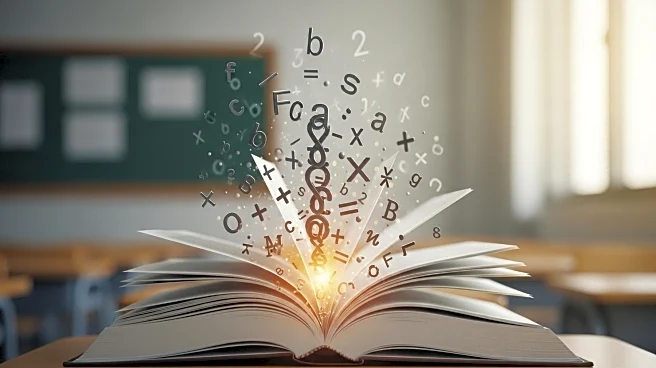What's Happening?
The latest results from the National Assessment of Educational Progress (NAEP), often referred to as 'the nation’s report card,' indicate a significant decline in the academic performance of U.S. high school seniors. The average reading and math scores among 12th graders have fallen to their lowest levels on record in 2024. Additionally, eighth graders' scores on a science test have also decreased. This marks the first time these assessments were conducted since the pandemic, highlighting ongoing challenges in recovering from learning disruptions. The data shows that only 22% of 12th graders achieved proficiency in math, and 35% in reading, with a notable gap between high and low performers. The decline in scores suggests that many students may not be adequately prepared for college-level coursework, potentially necessitating remedial education.
Why It's Important?
The decline in student performance as indicated by the NAEP results has significant implications for the U.S. education system and the broader economy. With fewer students achieving proficiency in core subjects, there is a concern about the future workforce's readiness to meet the demands of a rapidly advancing technological society. The results suggest a need for educational reforms to address these gaps, particularly in STEM education, which is crucial for national economic competitiveness and security. The decline in science scores among eighth graders, coupled with a resurgence of the gender gap, underscores the need for targeted interventions to foster interest and proficiency in these critical areas.
What's Next?
Educational stakeholders may need to reassess and adapt teaching strategies to better support students' learning needs. This could involve integrating more engaging and relevant content into the curriculum to motivate students, particularly in science. Additionally, there may be a push towards implementing models that combine developmental and on-level instruction to help students catch up. Policymakers and educators will likely focus on creating a more cohesive education system that aligns with students' goals and prepares them for future challenges.
Beyond the Headlines
The decline in student scores also raises questions about the long-term impacts of the pandemic on education and the potential need for systemic changes. The emphasis on reading and math post-pandemic may have inadvertently reduced focus on other subjects like science, suggesting a need for a more balanced approach. Furthermore, the drop in student interest in science highlights the importance of making education more engaging and relevant to students' lives.









